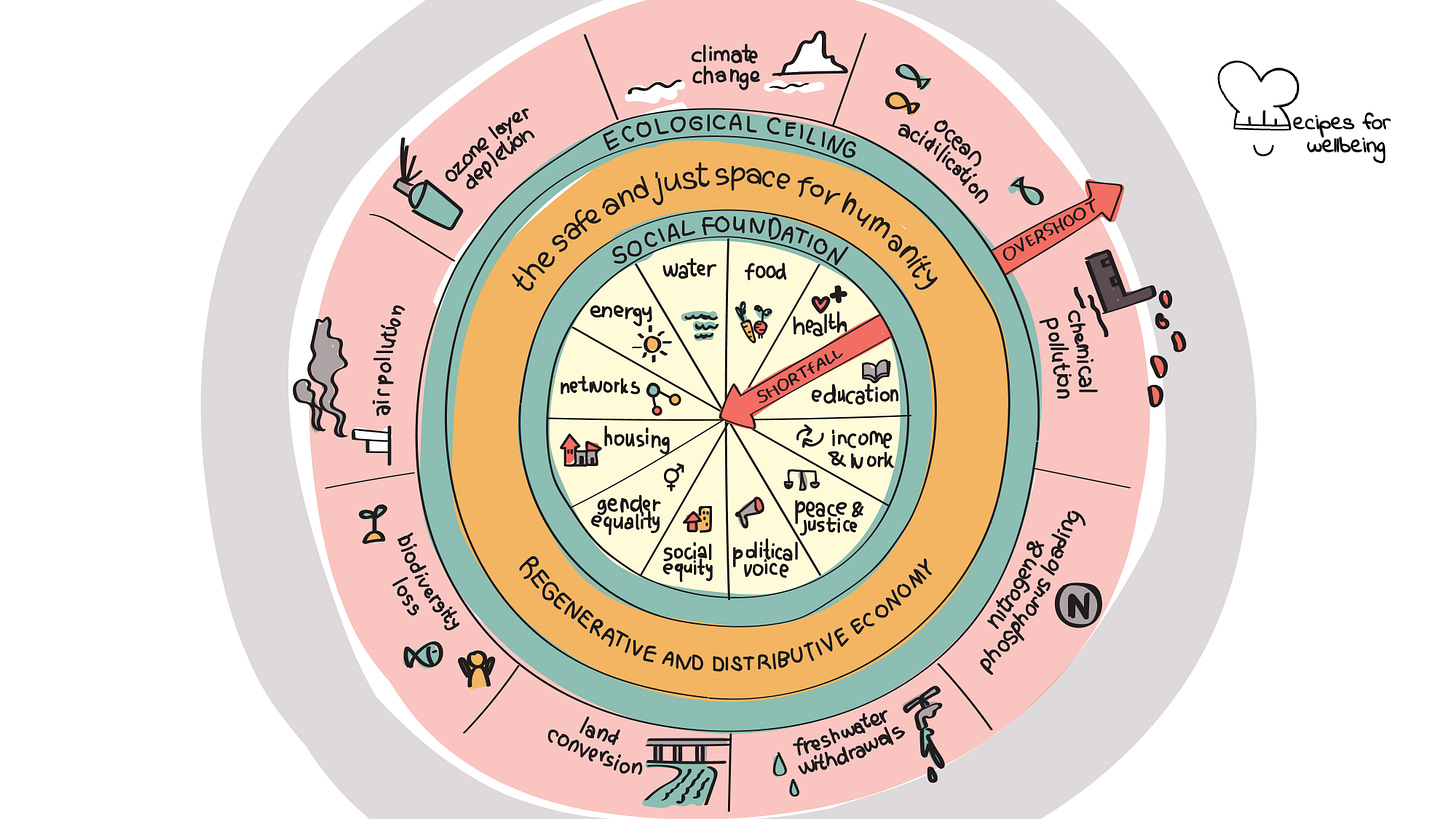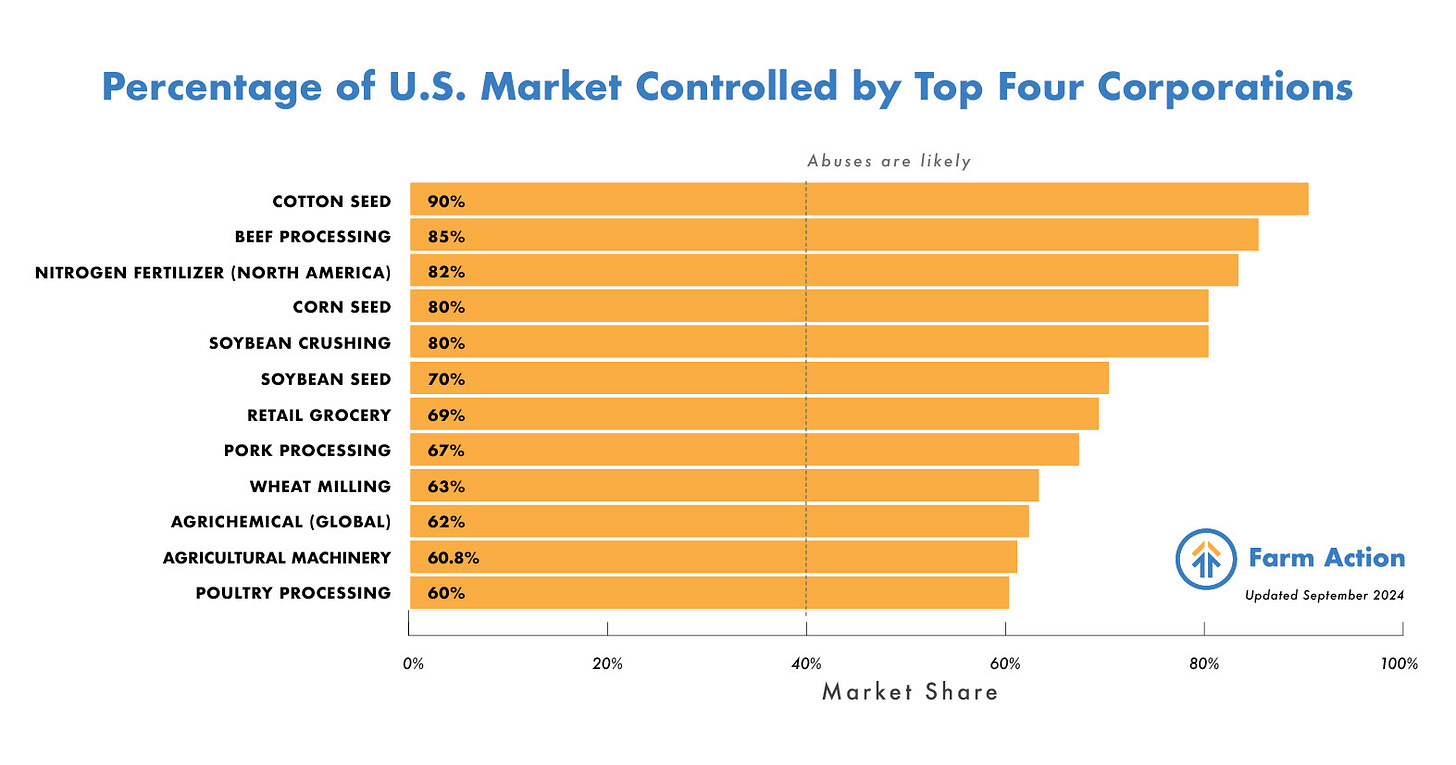The Great Depletion: Quality, Squareness, Doughnut Economics, & RFK
Can we bring back "quality" to our economy and our food system?
This post introduces the idea of “depletion” as a form of inflation and identifies the primary forces behind it. Then, it applies depletion to the food system and considers our prospects for restoring quality to food.
Depletion— the flip side of inflation
Inflation is the face of economic deterioration, but there is another side to that coin: depletion. While inflation refers to the increase in price of goods or services, depletion refers to the decrease in value of those goods or services. One well-known form of depletion is “shrinkflation,” where sellers offer less volume or a shorter service for the same price, rather than increasing the price.
But depletion can be even more insidious. I argue that—rather than higher prices or lower volumes—the dominant American concession has been to the quality of goods and services.
We see depletion of quality nearly everywhere. It’s so obvious that examples may be hardly useful: corn syrup drinks, McMansions, plastic cups, red40, AI “art”, fast fashion, PE-funded dentist office squeeze-jobs and roll-ups, deep-fried factory-farmed chicken on every corner. Fillers, carcinogens, environmental externalities, child labor—try to find something on Amazon that doesn’t check at least one of these boxes.
We’ve been moving in this direction for at least 50 years, as famously described by philosopher Robert Pirsig in 1974’s Zen and the Art of Motorcycle Maintenance. In that best seller, Pirsig argues that quality, or value, is a fundamental driving force of human flourishing. But what makes something of quality? Pirsig says that defining quality is either impossible or mostly unhelpful. Instead, people have a natural sense for quality and it is the result of people taking care in our work and lives. The opposite of quality, the absence of quality, or the inability to see quality is called squareness, and dooms us to fall for marketing ploys and consumerism.
Technology is Square
Technology is inherently valueless—inherently square. Technology only gives us progress when it is used with wisdom. At its worst, technology can operate on increasingly obscure mechanisms that alienate us from understanding or judging quality. For example, factory farms and social media algorithms change how we receive meat and information, respectively, processed in complex black boxes designed to be hidden from the public. We also cannot readily tell if a neurotoxin pesticide or preservative has been used on our food; relying instead on the commitment (or not) of food producers (and their regulators) to quality.
Pirsig says, “There is an evil tendency underlying all our technology - the tendency to do what is reasonable even when it isn't any good.” In this country, “what’s reasonable” usually means what’s immediately profitable. That’s because our economic system is square too (see next section). It doesn’t have to be this way. As an avowed solarpunk, I dream of technology serving moral progress and environmental restoration (like vaccines and wastewater treatment do).
Our Economics are Square
Our economic models are square. GDP, employment rates, profit margins, and index prices get measured and managed, but tell a story that largely ignores quality. We can feel the squareness. NPR has coined the term “vibe recession” to describe how nearly half of Americans feel pessimistic about the economy and that they are doing worse than they were a few years ago.
The result of all this squareness is the human tendency towards technology-enabled, economically-motivated“magic bullet” solutions. Hence our petrochemical-based fashion industry, pharmaceutical-centric healthcare, chemical-dependent agriculture, and antibiotic-reliant factory farmed meat.
We might instead take a broader view of quality in economics. One that doesn’t just consider human social wellbeing metrics—like Bhutan’s Gross National Happiness (GNH)—but also considers sustainability of the goods like Oxford’s concept of Doughnut Economics (graphic below).

Depletion in the environmental context means that a quality good/service will not be available in the future because we’ve over-used a natural resource. Examples of this overshoot includes hunting an animal to extinction, logging old-growth forests, sterilizing the topsoil, or the wiping out of so much ancestral and/or indigenous knowledge.
Our Food is Square
The stunning and increasingly obvious depletion of quality in our food is one of the driving forces behind the political ascension of RFK. The Internet overflows with stories about seed oils, “not getting fat in Italy stories”, homeopathy influencers, and the dangers of ultra-processed foods—all of which offer at least some truth.
It all goes back to what we grow, how we grow it, and what we go with those crops; with all phases severely lacking diversity of options and trending towards commodification. The result is tired soil depleted of critical mineral-creating microbial biodiversity through years of industrial monocropping of primarily corn, soy, and wheat. (I get more into it here). The obliteration of diversity in the soil, in crop selection, and in farming communities was directly driven by agricultural policy that utterly ignores quality in favor of techno-economics (The Meat Racket providing good examples). The result is an anti-local food system where the majority of our calories are intensively processed by at a very minimum one large agribusiness corporation. I’d argue that commodification by agribusiness and grocers, which made possible factory farms, dependent corn fields, and ultra-processed foods, was the death knell of quality food.

RFK and Regenerative Agriculture
Robert F. Kennedy (RFK) and the Make America Healthy Again (MAHA) camp, finally, provides cabinet-level acknowledgement of agricultural’s primacy to public health. (Ignoring his controversial vaccination stance for a moment). MAHA advocates for a reboot of food from the soil up, acknowledging the potential of “food as medicine” as well food’s current status as largely the opposite. RFK says farmers want an off-ramp from our chemical-and-commodity food system. He’s obviously imperfect, but if RFK and his MAHA movement is earnest, effective, and un-beholden to the agro-industrial complex, then it might be possible to increase quality to our food system.
The hope is a food system that is regenerative: Farm subsidies that go to actual farming communities to grow diverse crops that nourish rather than harm consumers. The risk is a war-is-peace-level greenwashing by agribusiness where they, again, re-write the rulebook in their favor, sacrificing the last shreds of quality to make food cheaper. I wrote about the risk of greenwashing in regenerative agriculture here, but I still think it’s an incredibly exciting movement. I dream of a substantive national debate on depletion and the how we can leverage regenerative agriculture to improve our health and environment.
In the meantime, I am getting my garden ready.
This is Fifth Industrial, a blog scouting emerging technologies and ideas for a regenerative economy and lifestyle. See the posts on the most impactful bioproducts, plant cell culture, cellular agriculture, mycelium materials, synthetic silk, microbiomics, deep space food, alt cheese, alt protein CPG, biophilia, agricultural innovation engines, longevity, egg sexing, mosquito-borne disease, and wild animal welfare.







Hey mate!
Given your interest in cell-based agri, you might enjoy my recent piece on eXoZymes Inc. They’ve just commercially launched a cell-free enzyme biocatalysis platform that converts biofeedstocks into targeted chemical products.
https://www.slack-capital.com/p/exozymes-research-report
<homersimpson>"I know you're upset. But don you ever, EVER badmouth donuts!"</>
;-)